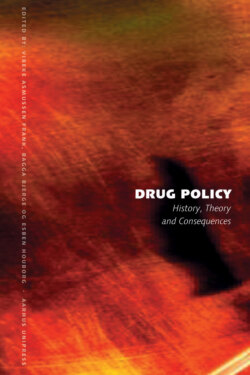Читать книгу Drug Policy - Группа авторов - Страница 12
На сайте Литреса книга снята с продажи.
Drug policy as practice
ОглавлениеThere seems to be a general perception that when a law or regulation is passed it is implemented in the way it was planned and has the effects it was planned to have. For instance, when the Ministry of Social Affairs in Denmark declares a 14-day treatment guarantee for people who wish to be enrolled in a drug treatment programme, one would expect this to happen. This, however, is not necessarily the case in practice (Pedersen & Nielsen 2007). Sociological, anthropological and political science studies of everyday practices in crowded local government offices, public treatment centres and shelters show that laws and regulations are interpreted, manipulated and acted out in various ways (Moore 1978; Lipsky 1980; Winter 2004).10 To understand a policy, it is therefore necessary to take the context in which it is implemented into account. All sorts of different factors may influence the outcome of a policy; economic constraints, high work pressure, competing moral positions and rationalities. In Lipsky’s words:
I argue that the decisions of street-level bureaucrats, the routines they establish, and the devices they invent to cope with uncertainties and work pressures, effectively become the public policy they carry out. I argue that public policy is not best understood as made in legislatures or top-floor suites of high-ranking administrators, because in important ways it is actually made in the crowded offices and daily encounters of street-level workers (Lipsky 1980: xii).
In other words, if one wishes to understand the effects of a policy in practice, one has to investigate actions, interpretations and strategies carried out in these everyday practices. This perspective recognises the actor as relatively autonomous and focuses on situated practices in particular institutional settings in order to explain policy by deploying both institutionalist (Prottas 1978; 1979; Lipsky 1980) and interactionist (Zimmerman 1969; Holstein & Miller 2003) theories. Users and practitioners develop strategies and coping mechanisms and play specific roles to overcome stressful dilemmas, or try to push their personal agendas through by interpreting policies actively. This perspective acknowledges the societal framework of actions and conduct. For instance, a substance-abuse treatment centre is regulated by its position in the public sector, by its economy, by laws regulating social service etc, and by societal notions and norms of conduct. But the focus is on the ways in which actors try to overcome dilemmas between the demands of users and clients on the one hand, and the organisation on the other. Thus, it is through the interactions between the institutional context, employees, users, laws and regulations that policy takes effect in practice.
